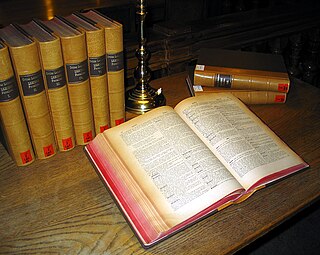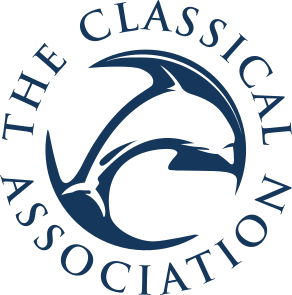
Classics or classical studies is the study of classical antiquity. In the Western world, classics traditionally refers to the study of Ancient Greek and Roman literature and their original languages, Ancient Greek and Latin. Classics may also include as secondary subjects Greco-Roman philosophy, history, archaeology, anthropology, art, mythology, and society.

Neo-Latin is the style of written Latin used in original literary, scholarly, and scientific works, first in Italy during the Italian Renaissance of the fourteenth and fifteenth centuries, and then across northern Europe after about 1500, as a key feature of the humanist movement. Through comparison with Latin of the Classical period, scholars from Petrarch onwards promoted a standard of Latin closer to that of the ancient Romans, especially in grammar, style, and spelling. The term Neo-Latin was however coined much later, probably in Germany in the late eighteenth century, as Neulatein, spreading to French and other languages in the nineteenth century. Medieval Latin had diverged quite substantially from the classical standard and saw notable regional variation and influence from vernacular languages. Neo-Latin attempts to return to the ideal of Golden Latinity in line with the Humanist slogan ad fontes.

The Latin school was the grammar school of 14th- to 19th-century Europe, though the latter term was much more common in England. Other terms used include Lateinschule in Germany, or later Gymnasium. Latin schools were also established in Colonial America.

Caroline Lawrence is an English American author, best known for The Roman Mysteries series of historical novels for children. The series is about a Roman girl called Flavia and her three friends: Nubia, Jonathan and Lupus. The series has won numerous awards and has been published in many different languages worldwide. In March 2010, Lawrence was commissioned to write another history mystery series of books called The Western Mysteries, set in Virginia City, Nevada Territory in the early 1860s.
Cambridge Assessment English or Cambridge English develops and produces Cambridge English Qualifications and the International English Language Testing System (IELTS). The organisation contributed to the development of the Common European Framework of Reference for Languages (CEFR), the standard used around the world to benchmark language skills, and its qualifications and tests are aligned with CEFR levels.
The Joint Association of Classical Teachers (JACT) was a UK organisation for the encouragement of the teaching of Classics in schools and universities. It was merged into the Classical Association with effect from 2 January 2015. The JACT Summer Schools Trust (JSST) continues to run the four JACT summer schools.
William Henry Denham Rouse was a pioneering British teacher who advocated the use of the "direct method" of teaching Latin and Greek.

Contemporary Latin is the form of the Literary Latin used since the end of the 19th century. Various kinds of contemporary Latin can be distinguished, including the use of Neo-Latin words in taxonomy and in science generally, and the fuller ecclesiastical use in the Catholic Church – but Living or Spoken Latin is the primary subject of this article.
Patricia Elizabeth Easterling, FBA is an English classical scholar, recognised as a particular expert on the work of Sophocles. She was Regius Professor of Greek at the University of Cambridge from 1994 to 2001. She was the 36th person and the first — and, so far, only — woman to hold the post.

The Latin language is still taught in many parts of the world. In many countries it is offered as an optional subject in some secondary schools and universities, and may be compulsory for students in certain institutions or following certain courses. For those wishing to learn the language independently, there are printed and online resources.

The Classical Association (CA) is an educational organisation which aims to promote and widen access to the study of classical subjects in the United Kingdom. Founded in 1903, the Classical Association supports and advances classical learning in schools, colleges, universities and local areas, and it has a wide membership. The Classical Association is a member of the Council for Subject Associations and is a registered charity.
Scott Thornbury is an internationally recognized academic and teacher trainer in the field of English Language Teaching (ELT). Along with Luke Meddings, Thornbury is credited with developing the Dogme language teaching approach, which emphasizes meaningful interaction and emergent language over prepared materials and following an explicit syllabus. Thornbury has written over a dozen books on ELT methodology. Two of these, 'Natural Grammar' and 'Teaching Unplugged', have won the British Council's "ELTon" Award for Innovation, the top award in the industry.
The Classical Association of the Middle West and South (CAMWS) is a professional organization for classicists and non-classicists at all levels of instruction which promotes the Classics through the broad scope of its annual meeting, through its publication of both original research and pedagogical contributions in The Classical Journal and Teaching Classical Languages and through its awards, scholarships, and outreach initiatives.

James Henry Weldon Morwood was an English classicist and author. He taught at Harrow School, where he was Head of Classics, and at Oxford University, where he was a Fellow of Wadham College, and also Dean. He wrote almost thirty books, ranging from biography to translations and academic studies of Classical literature.

The classical education movement or renewal advocates for a return to a traditional European education based on the liberal arts, the Western canons of classical literature, the fine arts, and the history of Western civilization. It focuses on human formation and paideia with an early emphasis on music, gymnastics, recitation, imitation, and grammar. Multiple organizations support classical education in charter schools, in independent faith-based schools, and in home education. This movement has inspired several graduate programs and colleges as well as a new peer-reviewed journal, Principia: A Journal of Classical Education.
The BYU College of Humanities was formed in 1965 by the division of the College of Humanities and Social Sciences into the College of Humanities and the College of Social Sciences. The College of Social Sciences was later merged into the College of Family, Home and Social Sciences although some of its programs were made part of the David M. Kennedy Center for International Studies.
John E. Sharwood Smith OBE DFC MA (1919-2007) was an English professor of Classics who wrote numerous books on classics and learning classics.
Carol Margaret Handley was a British educator who was headmistress of Camden School for Girls (1971–1985) and president of the Classical Association (1996–1997). Handley was later a classics tutor at Wolfson College, Cambridge. Handley is known for her longstanding advocacy for Classics education in schools and universities, as well as for her work on teaching and examination materials for the Joint Association of Classical Teachers and for the University of Cambridge.

Christopher Allan Stray is a British historian of classical scholarship and teaching.
John Philip Algernon Gould, was a British classical scholar. He specialised in Greek tragedy, but also had wider interests in ancient Greek literature, ancient Greek religion and anthropology. He began his academic career as a research fellow at Jesus College, Cambridge (1949–1953), and then a tutor and student at Christ Church, Oxford (1954–1968). He was Chair of Classics at the University College of Swansea from 1968 to 1974, and the H O Wills Professor of Greek at the University of Bristol from 1974 to 1991.









